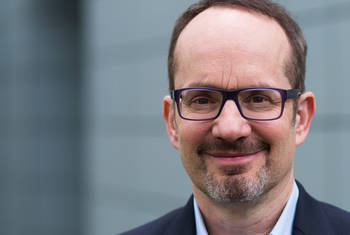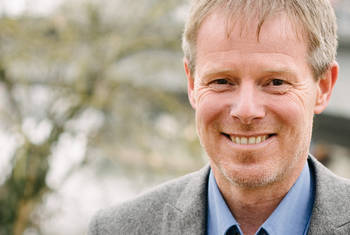Ruth E. Ley To Which Extent Do Genetics Determine the Composition of the Gut Microbiome?
Ruth Ley is Director of the Department of Microbiome Science at the Max Planck Institute for Developmental Biology in Tübingen, Germany. In her research she investigates the co-evolution of humans with their microbiomes and explores how host genetics affect the composition of the microbiome. For her scientific achievements Ley has received a number of awards including the NIH Director’s New Innovator Award in 2010, and the ISME Young Investigators Award in 2014. In 2016, she was appointed Honorary Professor at the Faculty of Medicine of Tübingen University.
Area of Research
Molecular Genetics
since 2016
Director
Max Planck Institute for Developmental Biology
Department of Microbiome Science
2014-2017
Associate Professor
Cornell University
Department of Molecular Biology and Genetics
2013-2017
Associate Professor
Cornell University
Department of Microbiology
2011-2014
Adjunct Asst. Professor
Cornell University
Department of Molecular Biology and Genetics
2008-2013
Assistant Professor
Cornell University
Department of Microbiology
2007-2008
Research Assistant Professor
Washington University School of Medicine
2005-2007
Instructor
Washington University School of Medicine
2004-2005
Post-Doc
Washington University School of Medicine
Center for Genome Sciences
2001-2004
Post-Doc
Colorado State University
Molecular, Cellular and Developmental Biology
2001
PhD
Colorado State University
Ecology and Evolutionary Biology
1992
B.A.
University of California, Berkeley
Integrative Biology
Prizes
- - Honorary Professor, Faculty of Medicine, Tübingen University (2016)
- - International Society for Microbial Ecology (ISME) Young Investigator’ s Award (2014)
- - Cornell University College of Agriculture and Life Sciences Research and Extension Award for Outstanding Accomplishments in Early Achievement (2011)
- - NIH Director’ s New Innovator Award (2010)
- - Hartwell Investigator (2009)
- - Beckman Young Investigator (2009)
- - Pew Biomedical Scholar (2009)
- - NSF Doctoral Dissertation Improvement Grant (2001)
- - American Society for Microbiology Student Travel Grant (2001)
- - Department of Ecology and Evolutionary Biology Research Grant, University of Colorado, Boulder (1997, 2000)
- - Beverly Sills Research Grant Award, University of Colorado, Boulder (1998)
Fellowships
- - Packard Fellow (2010)
- - Kavli Fellow, National Academy of Sciences (2007)
- - NASA Astrobiology Research Associateship, National Research Council (2001-2003)
- - NSF Biosphere-Atmosphere Research Training Fellowship, University of Colorado, Boulder (1996-1998)
 © Maximilian Dörrbecker
© Maximilian Dörrbecker
Max Planck Society
"The Max Planck Society is Germany's most successful research organization. Since its establishment in 1948, no fewer than 18 Nobel laureates have emerged from the ranks of its scientists, putting it on a par with the best and most prestigious research institutions worldwide. The more than 15,000 publications each year in internationally renowned scientific journals are proof of the outstanding research work conducted at Max Planck Institutes – and many of those articles are among the most-cited publications in the relevant field." (Source)
Institute
Max Planck Institute for Developmental Biology
"Contemporary biology covers an enormous scale, from research on basic cellular processes to predictions about global climate change. But this spectrum has not been continuous: while biologists have long known that organisms physically adapt to their natural environments, too often the underlying genetic, molecular and biochemical processes have remained a mystery. The MPI for Developmental Biology is uniquely poised to help close this gap. At the atomic level, we are investigating how protein machines work. At the molecular and subcellular level, we are studying how proteins and RNA molecules cooperate to regulate fundamental processes such as transcription, translation and signal transduction and how this is dependent on the location of proteins within the cell. At the tissue level, we are determining how cells interact to produce complex outcomes during development. Finally, at the organism level, we are asking how the naturally occurring interactions among microbes, plants and animals shape their genomes." (Source)
Map
The gut microbiome has a significant influence on various diseases ranging from malnutrition to chronic inflammation. It is largely shaped by environmental factors, like diet and lifestyle. How the genetics of the individual affect the composition of the microbiome, however, was largely unknown. RUTH LEY explains in this video that the research team addressed this question by comparing the microbiome of over 1000 twin pairs based on DNA extracted from their stool samples. These comparisons allowed the researchers to compile a list of heritable microbes, top of which is a family of bacteria called the Christensenellaceae. One key finding was that the microbiome of lean individuals contains more of this type of bacteria as compared to the microbiome of obese people. Further experiments showed that, if Christensenellaceae are given to germ free mice, their amount of body fat is reduced. These results might lead to novel therapeutic approaches to obesity and associated diseases.
LT Video Publication DOI: https://doi.org/10.21036/LTPUB10378
Human Genetics Shape the Gut Microbiome
- Julia K. Goodrich, Jillian L. Waters, Angela C. Poole, Jessica L. Sutter, Omry Koren, Ran Blekhman, Michelle Beaumont, William Van Treuren, Rob Knight, Jordana T. Bell and Ruth E. Ley
- Cell
- Published in 2014









